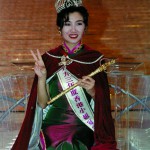Professor Wong Wai-ching, co-director of the Gender Research Centre of Hong Kong Institute of Asia-Pacific Studies, says the TV industry still sees pageants as money-spinners but “classic elegance” is no longer seen as a selling point.
“It’s not like the quality of the contestant in the past was exceptionally better when compared to the present. It’s just a matter of how the producer packages the competition,” Wong explains.
Wong says cultural changes in the past few decades have contributed to the shrinking popularity of beauty pageants. In e late 20th century Hong Kong, there were fewer opportunities for women since they rarely received higher education. Being in front of millions of viewers on TV was considered to be a tremendous achievement at that time.
“It was not only the contestants who looked forward to the opportunity to climb up the social ladder. Even the audiences were excited to see how average girls went from rags to riches in one night,” she says.
Iconic Miss Hong Kongs like Maggie Cheung Man-yuk and Loletta Chu Ling-ling either earned great fame in the movie industry, or married wealthy husbands. Both of these were seen as something to aspire to. Their successes made people recognise beauty contests as an effective channel for women to develop their “careers”.
But as women became better educated and had more career choices, beauty queens began to lose their symbolic status. Even for those who want to enter the entertainment industry, beauty pageants are not the only or even best way to get a foot in the door. A variety of talent shows and artist training programmes are available which lower the value of joining the competition.

Witnessing how the nature of beauty contests has changed in the past two decades, Mok Ho-yan, Miss Hong Kong of 1993, links the decline of beauty pageants to the rise of sensationalist tabloid-style media and public scrutiny of contestants’ personal lives.
“In the past, the daily lives of Miss Hong Kongs were kept very secret and they felt like a mystery to the public,” Mok recalls. “The public admired and idolised them because they hardly knew these gorgeous celebrities.”
Today, the private lives of Miss Hong Kongs are constantly exposed and the public may lose interest once their mysterious aura is removed and they are shown to be not that different to the rest of us.
To sell newspapers and magazines, some paparazzi may exaggerate any negative news associated with the contestants and use wording full of sexual innuendo and titillation. Mok believes the image of classic beauty has been degraded as a result and the public’s attention has been deflected from the contestants’ performances in the competition.
Unlike the more restrained media coverage in the past, the paparazzi will now wait outside TVB City on the day applications are accepted to get a first glimpse of the contestants. The private lives of both the contestants and their families are served up to the public once they sign up for the pageant.







































